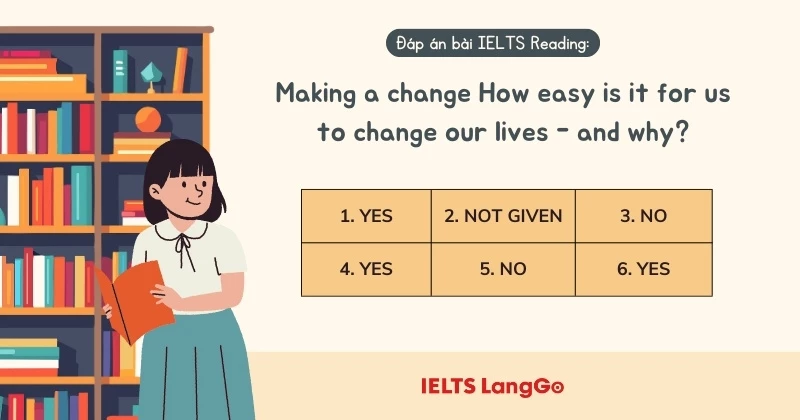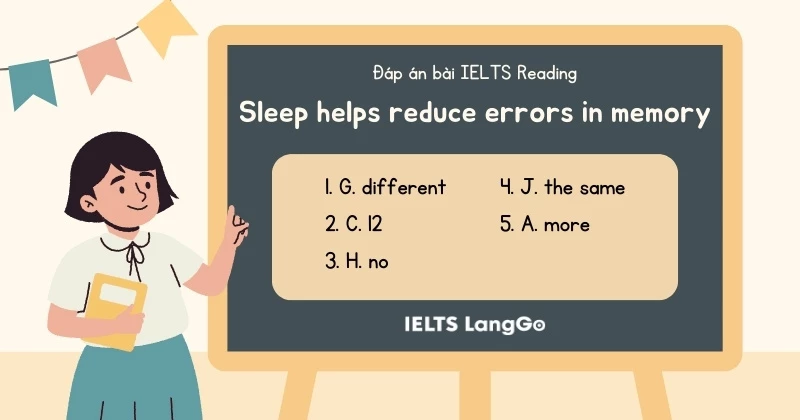


Tiếp tục với chuỗi luyện đề IELTS Reading, trong bài học hôm nay, chúng ta sẽ cùng đến với chủ đề Being Human qua 2 bài đọc:
Tương ứng với 2 bài đọc, chúng ta sẽ cùng thực hành làm 2 dạng bài quen thuộc trong IELTS Reading, lần lượt là Yes/ No/ Not Given và Summary completion.
Trước khi bắt tay vào làm bài đọc, các bạn hãy cùng note lại một số chú ý khi làm 2 dạng bài này nhé!
Với những lưu ý trên đây, hy vọng là các bạn đã sẵn sàng thử sức với 2 bài đọc. Chúng ta cùng bắt đầu nhé!
Reading Passage:
| Making a change How easy is it for us to change our lives - and why? In 1990, a young American named Christopher McCandless gave up his career plans, left behind everyone he knew, including his family, and went off on an adventure. He was 22 at the time. In an act of kindness, he donated all his savings to the famous charity, Oxfam International, and hitchhiked his way through America to Alaska. His decisions were so unusual for his age that Jon Krakauer wrote a book about them called Into the Wild, and Sean Penn directed a film that had the same title. Of course, this is an unusual story. Most college graduates would not do quite the same thing. However, studies do show that in teenage years, people are more likely to try out new experiences. Instead of following the family career path, for example, and working his way up the same organisation like his grandfather did, a 15-year-old may dream about becoming a traveller - only to find in his early 20s that this fascination with new places is declining and change is less attractive. This age-related trend can be observed in all cultures. The reason why people all over the world become less keen to change as they get older may be because people’s lives generally follow similar patterns and involve similar demands. Most people, wherever they are, aim to find a job and a partner. As they get older, they may have young children to look after and possibly elderly family members. These responsibilities cannot be achieved without some degree of consistency, which means that new experiences and ideas may not have a place in the person’s life. New experiences may bring excitement but also insecurity, and so most people prefer to stay with the familiar. However, not every individual is the same. One toddler may want to play a different game every day and get fed up if nothing changes at the nursery. Another may seek out and play with the same children and toys on every visit. Young children who avoid new experiences will grow up to be more conventional than others. Psychologists argue that those who have more open personalities as children are more open than others might be when they are older. They also suggest that young men have a greater interest in novelty than women, although, as they age, this desire for new experiences fades more quickly than it does in women. The truth is that, as we get older, we prefer the things we know. We tend to order the same meals in restaurants, sit on the same side of the train when we commute to work, go on holiday to the same places and construct our day in the same way. If you are older than 20, remember that your openness to new experiences is slowly declining. So you are better off making a new start today than postponing it until later. |
Questions 1-6
Do the following statements agree with the claims of the writer in the reading passage?
Write
YES if the statement agrees with the claims of the writer
NO if the statement contradicts the claims of the writer
NOT GIVEN if it is impossible to say what the writer thinks about this
1. ……………… Teenagers are more ready to have new experiences than young adults.
2. ……………… Grandparents usually encourage their grandchildren to get a well-paid job.
3. ……………… Life demands are different depending on which country you live in.
4. ……………… Some toddlers find repetitive activities boring.
5. ……………… Children who dislike new experiences become more adventurous than others as adults.
6. ……………… If you want to change something in your life, you should avoid delay.
Đáp án chi tiết

1. YES
Đề bài: Teenagers are more ready to have new experiences than young adults. (Thanh thiếu niên sẵn sàng có những trải nghiệm mới hơn so với người trưởng thành trẻ.)
Dẫn chứng (Đoạn 2): Studies do show that in teenage years, people are more likely to try out new experiences... only to find in his early 20s that this fascination with new places is declining and change is less attractive. (Nghiên cứu cho thấy trong độ tuổi thiếu niên, người ta có nhiều khả năng thử những trải nghiệm mới... chỉ để nhận ra rằng vào đầu những năm 20 tuổi, sự say mê với những địa điểm mới này đang giảm dần và sự thay đổi ít hấp dẫn hơn.)
Giải thích: Bài viết khẳng định rõ ràng rằng thanh thiếu niên sẵn sàng trải nghiệm những điều mới mẻ hơn so với người trưởng thành trẻ (early 20s).
2. NOT GIVEN
Đề bài: Grandparents usually encourage their grandchildren to get a well-paid job. (Ông bà thường khuyến khích cháu của họ có một công việc được trả lương cao.)
Dẫn chứng: Không có dẫn chứng cụ thể về vấn đề này trong bài văn.
Giải thích: Bài viết không đề cập đến việc ông bà khuyến khích cháu của họ tìm công việc được trả lương cao.
3. NO
Đề bài: Life demands are different depending on which country you live in. (Nhu cầu cuộc sống khác nhau tùy thuộc vào quốc gia bạn sống.)
Dẫn chứng (Đoạn 3): The reason why people all over the world become less keen to change as they get older may be because people's lives generally follow similar patterns and involve similar demands. Most people, wherever they are, aim to find a job and a partner. (Lý do tại sao người dân trên toàn thế giới trở nên ít mặn mà với sự thay đổi khi họ già đi có thể là vì cuộc sống của con người nói chung theo những mô hình tương tự và liên quan đến những đòi hỏi tương tự. Hầu hết mọi người, bất kể họ ở đâu, đều hướng tới việc tìm một công việc và một người bạn đời.)
Giải thích: Bài viết nói rõ rằng nhu cầu cuộc sống là tương tự nhau ở mọi nơi trên thế giới, không phụ thuộc vào quốc gia.
4. YES
Đề bài: Some toddlers find repetitive activities boring. (Một số trẻ nhỏ thấy các hoạt động lặp đi lặp lại nhàm chán.)
Dẫn chứng (Đoạn 4): One toddler may want to play a different game every day and get fed up if nothing changes at the nursery. (Một đứa trẻ mới biết đi có thể muốn chơi một trò chơi khác nhau mỗi ngày và cảm thấy chán nản nếu không có gì thay đổi ở nhà trẻ.)
Giải thích: Bài viết chỉ ra rằng một số trẻ nhỏ cảm thấy "fed up" (chán nản) nếu không có sự thay đổi, nghĩa là chúng không thích các hoạt động lặp đi lặp lại.
5. NO
Đề bài: Children who dislike new experiences become more adventurous than others as adults. (Trẻ em không thích trải nghiệm mới trở nên phiêu lưu hơn những người khác khi trưởng thành.)
Dẫn chứng (Đoạn 4): Young children who avoid new experiences will grow up to be more conventional than others. (Trẻ nhỏ tránh những trải nghiệm mới sẽ lớn lên trở thành người quy ước/truyền thống hơn những người khác.)
Giải thích: Bài viết nói rõ rằng trẻ em không thích trải nghiệm mới sẽ trở nên "more conventional" (quy ước/truyền thống hơn), không phải "more adventurous" (phiêu lưu hơn).
6. YES
Đề bài: If you want to change something in your life, you should avoid delay. (Nếu bạn muốn thay đổi điều gì đó trong cuộc sống của mình, bạn nên tránh trì hoãn.)
Dẫn chứng (Đoạn 5, câu cuối): So you are better off making a new start today than postponing it until later. (Vì vậy, bạn tốt hơn là nên bắt đầu lại từ hôm nay hơn là trì hoãn đến sau này.)
Giải thích: Câu kết luận của bài viết khuyên người đọc nên bắt đầu thay đổi ngay hôm nay thay vì trì hoãn, nghĩa là nên tránh sự chậm trễ.
Reading Passage:
| Sleep helps reduce errors in memory Sleep may reduce mistakes in memory, according to a first-of-its-kind study led by a scientist at Michigan State University. The findings, which appear in the September issue of the journal Learning El Memory, have practical implications for many people, from students doing multiple-choice tests to elderly people confusing their medicine, says Kimberly Fenn, principal investigator and assistant professor of psychology. ‘It’s easy to muddle things in your mind,’ Fenn says. This research suggests that after sleep, you’re better able to pick out the incorrect parts of that memory.’ Fenn and colleagues from the University of Chicago and Washington University in St Louis studied the presence of incorrect or false memory in groups of college students. While previous research has shown that sleep improves memory, this study is the first one that looks at errors in memory, she said. Study participants were ‘trained’ by being shown or listening to lists of words. Then, twelve hours later, they were shown individual words and asked to identify which words they had seen or heard in the earlier session. One group of students was trained at 10 a.m. and tested at 10 p.m. after the course of a normal sleepless day. Another group was trained at night and tested twelve hours later in the morning, after about six hours of sleep. Three experiments were conducted. In each experiment, the results showed that students who had slept did not have as many problems with false memory and chose fewer incorrect words. How does sleep help? The answer isn’t known, Fenn said, but she suspects it may be due to sleep strengthening the source of the memory. The source, or context in which the information is acquired, is a vital element of the memory process. In other words, it may be easier to remember something if you can also remember where you first heard or saw it. Or perhaps the people who didn’t sleep as much during the study received so much other information during the day that this affected their memory ability, Fenn said. Further research is needed, she said, adding that she plans to study different population groups, particularly the elderly. ‘We know older individuals generally have worse memory performance than younger individuals. We also know from other research that elderly individuals tend to be more prone to false memories,’ Fenn said. ‘Given the work we’ve done, it’s possible that sleep may actually help them to reject this false information. And potentially this could help to improve their quality of life.’ |
Questions 1-5: Complete the summary using the list of words and phrases, A-J, below.
| Fenn’s Memory Experiments The groups in the study saw or heard lists of words at 1. ……………… times of the day. After 2. ……………… hours, the groups tried to identify these words correctly in a test. Before the test, one group had 3. ……………… sleep and chose the words in the evening. The other group had their test in the morning. In three experiments, the results were 4. ……………… the groups that had slept during the experiment remembered 5. ……………… words correctly than the other groups. |
A. more
B. complex
C. 12
D. six
E. less
F. ten
G. different
H. no
I. fewer
J. the same
Đáp án chi tiết:

1. G. different
Đề bài: The groups in the study saw or heard lists of words at _______ times of the day. (Các nhóm trong nghiên cứu xem hoặc nghe danh sách từ vào _______ thời điểm trong ngày.)
Dẫn chứng (Đoạn 4): One group of students was trained at 10 a.m. and tested at 10 p.m. after the course of a normal sleepless day. Another group was trained at night and tested twelve hours later in the morning, after about six hours of sleep. (Một nhóm sinh viên được "huấn luyện" lúc 10 giờ sáng và kiểm tra lúc 10 giờ tối sau một ngày thức bình thường. Nhóm khác được huấn luyện vào ban đêm và kiểm tra mười hai giờ sau vào buổi sáng, sau khoảng sáu giờ ngủ.)
Giải thích: Bài viết chỉ rõ rằng các nhóm được huấn luyện (xem hoặc nghe danh sách từ) vào những thời điểm khác nhau trong ngày: một nhóm vào buổi sáng (10 giờ sáng) và nhóm khác vào ban đêm.
2. C. 12
Đề bài: After _______ hours, the groups tried to identify these words correctly in a test. (Sau _______ giờ, các nhóm cố gắng xác định đúng các từ này trong một bài kiểm tra.)
Dẫn chứng (Đoạn 4): Then, twelve hours later, they were shown individual words and asked to identify which words they had seen or heard in the earlier session. (Sau đó, mười hai giờ sau, họ được cho xem từng từ riêng lẻ và được yêu cầu xác định những từ nào họ đã thấy hoặc nghe trong phiên trước đó.)
Giải thích: Bài viết nêu rõ rằng sau 12 giờ kể từ khi được huấn luyện (xem hoặc nghe danh sách từ), các sinh viên được kiểm tra khả năng nhận diện những từ đã học.
3. H. no
Đề bài: Before the test, one group had _______ sleep and chose the words in the evening. (Trước bài kiểm tra, một nhóm đã có _______ giấc ngủ và chọn các từ vào buổi tối.)
Dẫn chứng (Đoạn 4): "One group of students was trained at 10 a.m. and tested at 10 p.m. after the course of a normal sleepless day." (Một nhóm sinh viên được "huấn luyện" lúc 10 giờ sáng và kiểm tra lúc 10 giờ tối sau một ngày thức bình thường.)
Giải thích: Nhóm được huấn luyện vào buổi sáng và kiểm tra vào buổi tối trải qua "a normal sleepless day" (một ngày thức bình thường), nghĩa là họ không ngủ giữa thời gian huấn luyện và kiểm tra.
4. J. the same
Đề bài: In three experiments, the results were _______ (Trong ba thí nghiệm, kết quả là _______)
Dẫn chứng (Đoạn 4): Three experiments were conducted. In each experiment, the results showed that students who had slept did not have as many problems with false memory and chose fewer incorrect words. (Ba thí nghiệm đã được tiến hành. Trong mỗi thí nghiệm, kết quả cho thấy những sinh viên đã ngủ không gặp nhiều vấn đề với trí nhớ sai và chọn ít từ không chính xác hơn.)
Giải thích: Bài viết nói rằng trong cả ba thí nghiệm, kết quả đều giống nhau - sinh viên ngủ đều có ít vấn đề với trí nhớ sai hơn.
5. A. more
Đề bài: the groups that had slept during the experiment remembered _______ words correctly than the other groups. (các nhóm đã ngủ trong thời gian thí nghiệm nhớ _______ từ đúng hơn các nhóm khác.)
Dẫn chứng (Đoạn 4): "In each experiment, the results showed that students who had slept did not have as many problems with false memory and chose fewer incorrect words." (Trong mỗi thí nghiệm, kết quả cho thấy những sinh viên đã ngủ không gặp nhiều vấn đề với trí nhớ sai và chọn ít từ không chính xác hơn.)
Giải thích: Bài viết nói rằng nhóm đã ngủ "chose fewer incorrect words" (chọn ít từ không chính xác hơn), nghĩa là họ nhớ nhiều từ đúng hơn so với nhóm không ngủ.
Với 2 bài IELTS Reading topic Being Human là Making a change How easy is it for us to change our lives - and why? và Sleep helps reduce errors in memory, hy vọng bạn đã có 1 buổi luyện tập kỹ năng IELTS Reading hữu ích cùng IELTS LangGo. Đọc thêm nhiều bài viết chất lượng trên website của LangGo để nâng trình tiếng Anh nhé!



ĐẶT LỊCH TƯ VẤN MIỄN PHÍ LỘ TRÌNH Săn ƯU ĐÃI lên tới 12.000.000đ